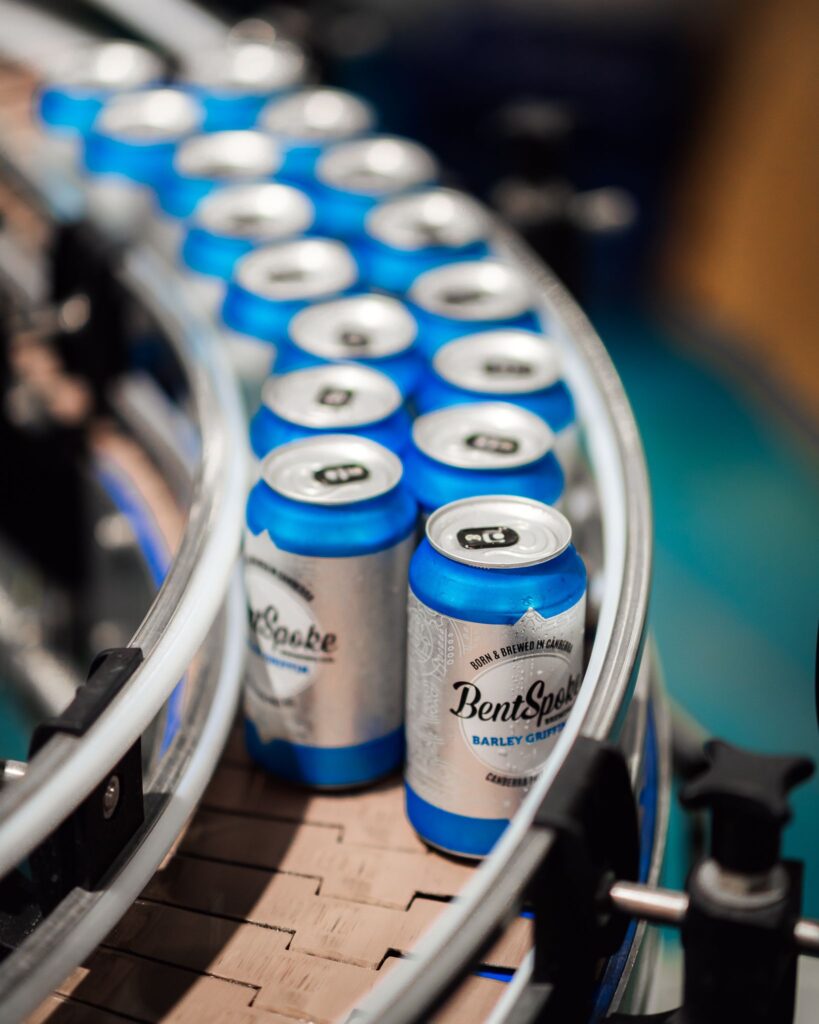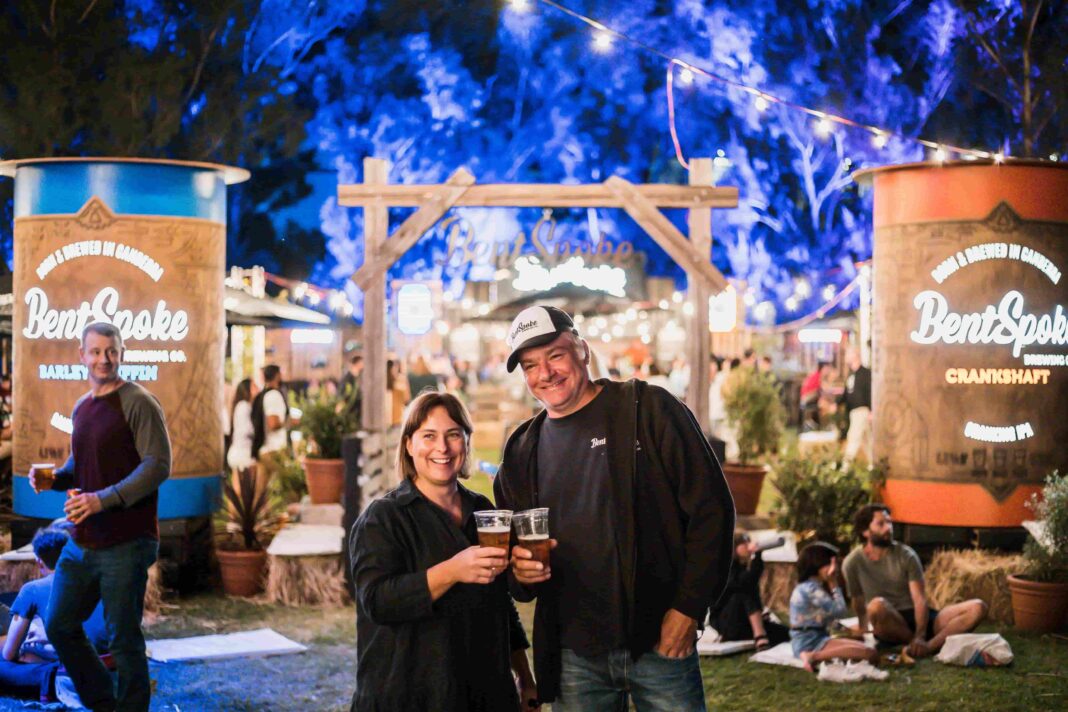Canberra craft beer brewery BentSpoke Brewing Co is hard pressed to keep up with demand, having grown over 30% in the past three years, winning awards in national and international arenas and exploding in the wholesale market.
When co-founder and head brewer, Richard Watkins, started out in the industry 25 years ago, there were seven small breweries in Australia.
Today, there are over 700 craft breweries occupying about 7% of the beer market – maybe 8% since COVID-19 – and Watkins is leading the pack as the nation’s longest serving craft brewer.
BentSpoke began as a brewpub in Braddon in 2014, before expanding two years later to open its cannery in Mitchell, now shipping wholesale quantities across the country.
Five years after opening, BentSpoke’s Barley Griffin – a ‘Canberra Pale Ale’ – won a Championship Trophy at the oldest brewing awards in the world, the International Brewing and Cider Awards 2019.
This year, the local brewery won first place in Australia’s biggest craft beer poll for its floral Crankshaft IPA, Watkins won Member of the Year at the AHA ACT Hospitality and Tourism Awards, and BentSpoke took home Best Beer Quality in AHA ACT’s Craft/Local category.
Speaking about the success of his and co-founder Tracy Margain’s business, Watkins told Canberra Daily he saw a consumer trend of people wanting more flavour from the food and beverages they consume.
“Whether it’s in going to the farmers markets and buying the best tomatoes you can buy, whether it’s finding a local honey supplier or getting your eggs from somewhere down the road,” he said. “People are really sourcing good local ingredients, both in food and obviously beverage as well.”
If the trend continues, Watkins predicts the independent craft brewing industry’s share of the market in Australia will grow by a couple of percentage points in as many years.

He said the cannery in Mitchell needed further upgrades – in addition to the recent installations of a new canning line and solar power – to keep growing.
“We’re actually getting to the point where we can’t really make enough beer here, so we’re looking at putting in a faster packaging line,” he said.
“It’s a little bit scary because obviously we’re still not out of COVID.
“But we have to try and move forward as best we can and try and make some upgrades so that we can keep up with demand.”
Despite being firmly embedded in the Canberra hospitality scene, the popular brewery was not immune to the downturn associated with the ‘COVID-recession’ and lockdown restrictions.
In March 2020, BentSpoke had 96 employees, one third of whom were working at its flagship venue in Braddon.
“That pretty well got shut down, so we lost a lot of people; we ended up going down to about 57 people,” Watkins said.
Remaining staff went on JobKeeper, which allowed BentSpoke to plan its next step – pivoting to sell takeaway beer from the pub.
“I think we released a new beer every week for 20 weeks in a row, just to give people something to want to come down and get some takeaway beer to go home with.”
Meanwhile, Australian bottle shops attracted more revenue that would otherwise have been spent in hospitality venues.
“Whilst we went to reduced hours [at the cannery] for a little while, we ended up ramping back up to meet demand, so we were the lucky ones.
“There’s lots of people in our community that weren’t as lucky as us, and our hearts go out to those people who maybe even lost their business because of it.”
BentSpoke didn’t qualify for the second round of JobKeeper, and Watkins said the business was happy to stand on its own two feet again.
Looking to the future of the craft brewing industry, Watkins hopes to see sustainable growth.
“Australia’s always been a little bit behind other countries in the world in terms of craft beer quantities.
“So, in the US, it’s always been pretty healthy, 15% of the beer market is craft beer; Japan’s always been a big craft beer country, same as New Zealand, same as the UK.
“I think the UK at the moment has got more breweries per capita than any other country in the world.”
According to Watkins, if the craft brewing industry Down Under were to grow to 10% of the market share, “there wouldn’t be enough stainless steel tanks in Australia” to brew that extra 2% in growth.
For those looking to enter the industry, he’s a “really big believer” that there are only two successful craft brewing models.
One is to start small with a brewpub – like BentSpoke did – by brewing onsite and selling beer exclusively as a retail product within the pub.
The other option is to go big, with a wholesale brewery that can make beer to sell at a competitive wholesale price, to justify the scale of the operation.
“Unfortunately, there’s a lot of breweries in Australia that are sitting in the middle,” Watkins said.
In his opinion, breweries that tried to “be a bit of both” retail and wholesale from the get-go were impeded by the cost of labour, which is why many struggled to grow or become a national brand.
“It’s very hard to wholesale your beer when you’re only making it on a much smaller scale, because it’s the same amount of labour to brew 500 litres of beer or 5,000 litres of beer – it roughly takes the same time.”
The Independent Brewers Association (IBA) made a pre-Budget submission which requested $300,000 in one-off funding to the IBA to support the development of a 10-year industry roadmap.
Watkins supported this proposal; he said it was important the Australian craft brewing industry was a community, and a central body leading the way was essential to its growth.
Currently, a Small Brewers Rebate Scheme allows eligible brewers to claim a refund of 60% of excise duty paid per annum, up to a cap of $100,000.
The second aspect of the IBA submission called for the cap to be raised by $250,000 to $350,000 to “accelerate the competitiveness of small brewers”.
Watkins said he was “a bit sceptical” about how that should be managed, and he would like to see tighter controls around how the extra cash was allowed to be spent.
“We’ve got a lot of passionate business owners who really believed in brewing really good quality craft beer, and we don’t want to see that ethos change in our industry.”
Watkins said he was concerned a bigger excise rebate may motivate people to set up new breweries for the wrong reasons.
“We don’t want to see people setting up breweries to try and make money, because they’re not doing it for the love of it, and craft beer is about the love of it.
“If you don’t love what you do, you shouldn’t be doing it.”



